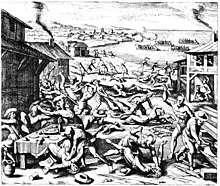Second Anglo-Powhatan War
| Anglo-Powhatan Wars | |||||||
|---|---|---|---|---|---|---|---|
| Part of the American Indian Wars | |||||||
 Indian massacre of 1622, depicted as a woodcut by Matthaeus Merian |
|||||||
|
|||||||
| Belligerents | |||||||
| English settlers | Powhatan Confederacy | ||||||
| Commanders and leaders | |||||||
| George Percy | Wowinchopunk | ||||||
The Anglo-Powhatan Wars were three wars fought between English settlers of the Virginia Colony, and Indians of the Powhatan Confederacy in the early seventeenth century. The First War started in 1610, and ended in a peace settlement in 1614. Another war between the two powers lasted from 1622 to 1626. The third war lasted from 1644 until 1646, and ended when Opechancanough was captured and killed. That war resulted in a boundary being defined between the Indians and English lands that could only be crossed for official business with a special pass. This situation would last until 1677 and the Treaty of Middle Plantation, which established Indian reservations following Bacon's Rebellion.
Complications with natives typically resulted at most of the settlements the English tried to establish from the beginning. The failed Roanoke colony marked the first contact between English settlers and Algonquian coastal tribes in North Carolina. “As early as 1585 an elder by the name of Richard Hakluyt bluntly stated the English Position for the new colony: The ends of they voyage [to America] are these: 1.to plant Christian religion 2.to Trafficke 3.to conquer”.
The first permanent English settlement, Jamestown, Virginia (May 1607), was within the territory of the powerful yet still expanding chiefdom of Wahunsunacawh (known to the English as Chief Powhatan). The Jamestown location was less than successful, because the conditions of this swampy area were far less than desirable , including: polluted water, significant amount of insects that carried disease, and soon, the lack of food supply. Jamestown, and the other colonies to be established in the "New World" were dependent on natives for a successful settlement.
Captain John Smith, a colonial leader, imagined that someday the Virginia Indians would be doing all the work for the English, but Powhatan envisioned something different: he wanted Smith and the colonists to forsake the swamp and instead live in one of his satellite towns called Capahosick where they would make metal tools for him in exchange for full provision. However, Smith underestimated the power of the Virginia Indians and what they were capable of, as they knew the land much better than the English. In December 1607, only seven months after building the fort on Jamestown Island, Smith, while reconnoitering the countryside near Orapax, one of Powhatan's capitals, was captured by a communal hunting party led by Opechancanough. Smith much later in life claimed that during his captivity, Pocahontas had dramatically saved him from Powhatan's clubs, but historians differ as to whether or not this was propaganda, or an actual native ritual. Smith's capture represented just an example of the diplomatic strategies employed by Wahunsunacawh to make the English cooperate with and contribute to his expanding control in this region. Smith was released in time for New Year's 1608, when he promised to move the colony to Capahosick. Smith had convinced the grand chief that he was the son of Captain Newport, and that Newport was their head weroance (tribal chief).
...
Wikipedia
